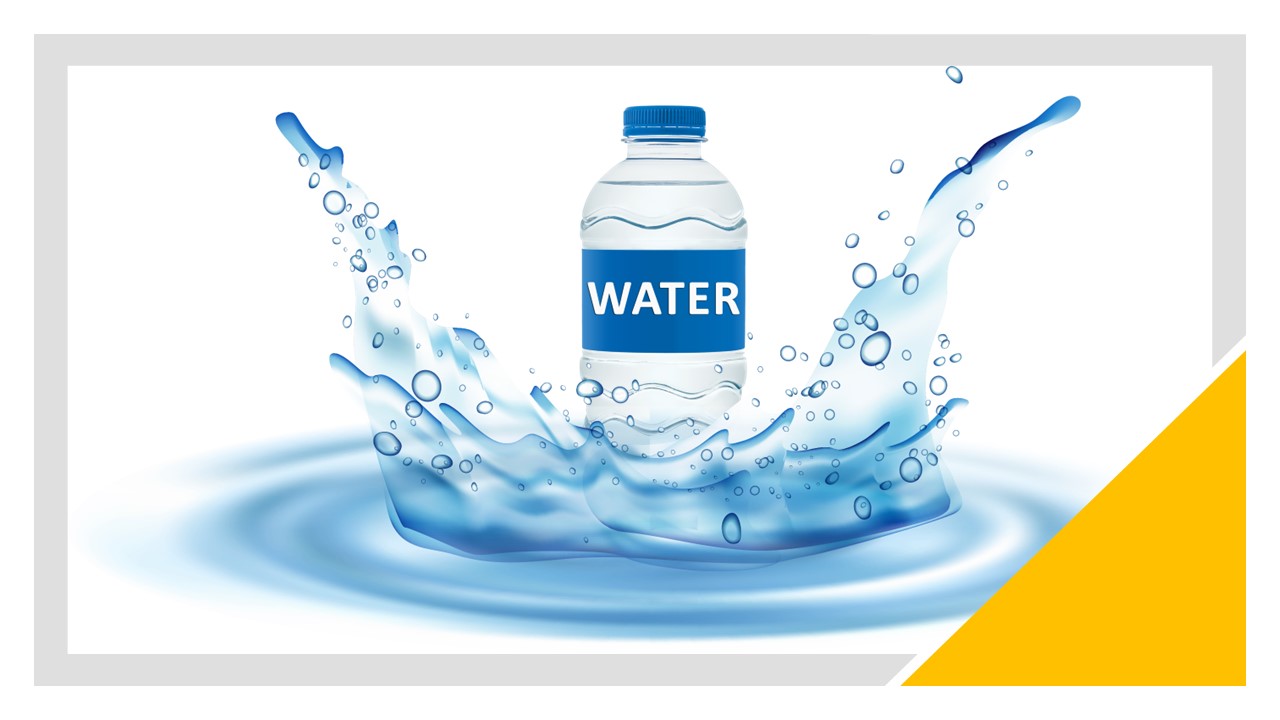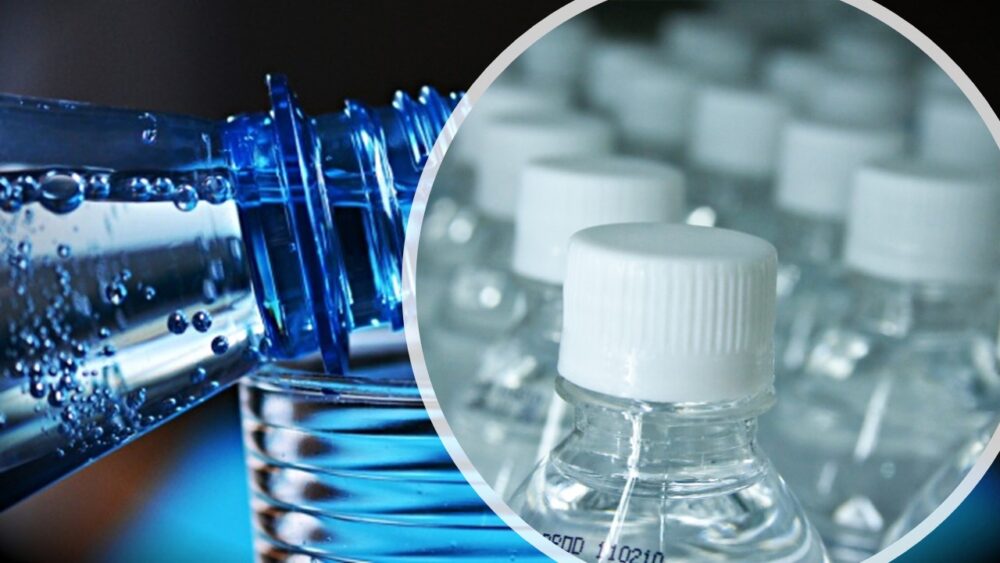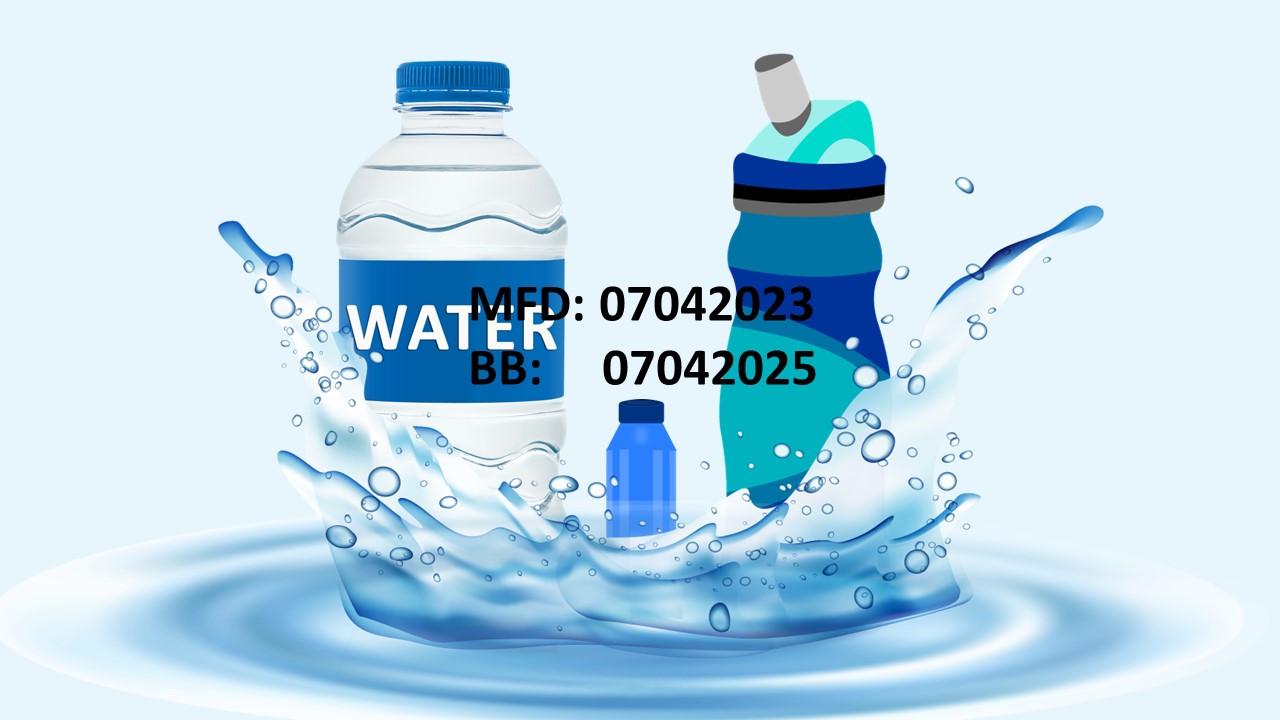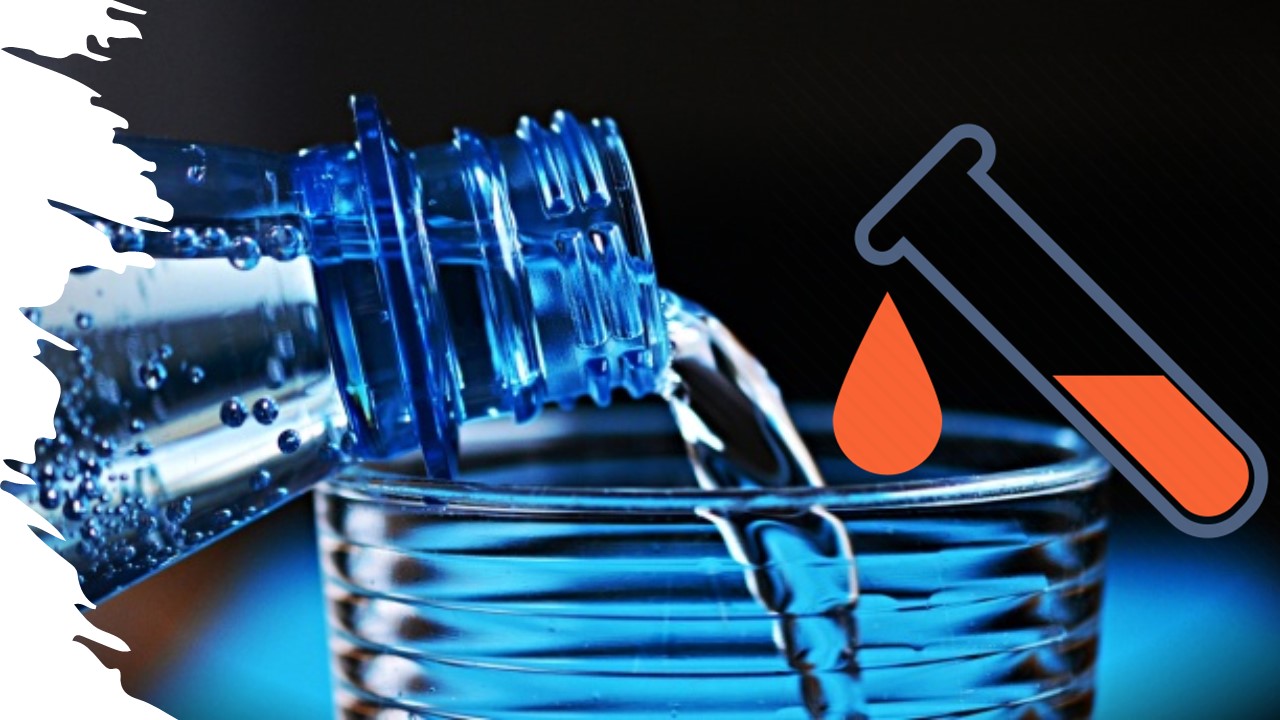Why Does My Bottled Water Smell Bad? – Should I Be Concerned?
Why does my bottled water smell bad? If you have ever opened up a bottle of water and been greeted with a less-than-pleasant smell, you’re not alone.
It is a common problem that can be caused by a number of factors, such as the type of liquid you have in it, the cleanliness of the bottle, how long the water has been in the bottle, high temperature or even the type of bottle you’re using.
In this article, we’ll take a closer look at why your bottled water might smell bad and what you can do to fix the problem. We’ll also provide some tips on how to prevent bad smells from happening in the first place.
Why Does My Bottled Water Smell Bad After A While
Water bottles, like all other containers, can develop a moldy smell over time. This is because most of them are made of porous materials that can absorb and retain moisture. When moisture is present, mold and mildew can grow, and this can cause a water bottle to smell bad.
Here are some of the reasons why your bottled water smells bad:
- The water absorbed the flavor of the item it came in contact with
- The bottle is dirty and the type of liquid in the bottle
- High temperature
- Bottle materials
- How long the water has been in the bottle
1. The Water Absorbed The Flavor Of The Items It Came In Contact With
It is common that bottled water tastes and smells bad because it has absorbed the flavors of the items it came in contact with.
When water is stored in a container, it will eventually take on the flavors of the container. So if your water has been stored in a plastic bottle, it’s likely that it will taste and smell like plastic. The same is true for water that’s been stored in a metal container. It will likely have a metallic flavor.
In fact, if the bottled water comes in contact with a flavorful beverage for some hours, your water will definitely take the flavor of that beverage and it will smell like the beverage or worse.
If you want to avoid these off-putting flavors, it’s important to store your water in a clean container. Glass is a great option because it doesn’t absorb flavors. But if you must use a plastic bottle, be sure to rinse it out well before you fill it with water.
2. The Bottle Is Dirty Or The Type Of Liquid In It
If the bottle isn’t cleaned properly, it can start to build up bacteria, and this can cause the water to smell bad.
If you use your bottle for not only water, some bottles may absorb the flavor of the liquid you put in the bottle and if not properly washed, your water will take the same flavor or worse the next time you fill it with water.
There are a few things you can do to prevent your water bottle from developing a moldy smell. First, always make sure to clean your water bottle after each use. You can wash it with soap and water, or you can use a bottle brush to clean it.
Second, try to avoid storing your water bottle in a humid environment. If you must store it in a humid environment, be sure to dry it off before putting the lid back on.
Finally, don’t forget to clean your water bottle regularly with a vinegar solution. This will help to kill any mold or bacteria that may be present in the bottle
3. High Temperature
It’s a hot summer day and you’re parched. You reach for a cold bottle of water, but when you open it, you’re met with a foul smell.
As it turns out, bottled water can start to smell bad when it’s stored in high temperatures. This is because water can become a breeding ground for bacteria, and the warmer the temperature, the faster the bacteria will grow.
Both metal and plastic water bottles are affected by hot temperatures, making the gases or air in the water bottle dissolve, and causing the bottle to smell bad. Temperatures do not affect premium stainless steel and glass water bottles
So, if you’re looking to avoid that dreaded bottle of water smell, be sure to store your water in a cool, dark place
Related: Why Are There Bubbles In My Water Bottle – Should You Be Concerned?
4. Bottle Materials
If you use plastic water bottle, there is a tendency that the bottle will start to wear and tear as it gets old. When this happens, bacteria begin to build up causing your water bottle to smell bad. While some plastic water bottles are great and durable, stainless steel and glass bottles are the best.
Stainless steel water bottles with premium grade 18/8 stainless steel materials do not smell bad as they can last up to 12 years. The same thing is applicable to bottles made with glass. Stainless steel bottles with 18/8 materials guarantee no erosion or decomposition, so they are super durable.
Still, you have to take care of your stainless steel and glass bottles by cleaning them regularly, especially after every use.
5. How Long The Water Has Been In The Water Bottle
Other than storing water in Stainless steel or glass bottles, storing water in a plastic or metal water bottle over an extended period can make the water smell bad. The plastic or iron would have leached some chemicals into the water, causing it to smell bad.
It also depends on how you store the water. If you store it close to an item that has some flavors, the water is bound to take the flavor of such an item and if it stays like that for an extended period, the smell will be bad when you open the water.
However, if you store your water in a stainless steel water bottle made with premium grade 18/8 stainless steel material for a week or more, the water will remain fresh and you will not experience any bad smell, especially if you clean the bottle before storing water in it.
RELATED: Does Water Bottles Expire

Health Implication Of Drinking Water From Bottled Water That Smell Bad After A While
Drinking water from water bottles that smell bad after a while can have several health implications. Here are some of them:
1. Bacterial Infection
If the water bottle is not cleaned properly or is reused too many times, bacteria can grow inside the bottle. Drinking water from such a bottle can lead to an upset stomach, diarrhea, and other digestive problems.
2. Possible Chemical Consumption
Plastic water bottles may contain harmful chemicals such as bisphenol A (BPA) and phthalates, which can leach into the water.
Drinking water from a water bottle that smells bad after a while may indicate that the plastic has started to break down and leach harmful chemicals into the water, which can cause health problems.
3. Possible Mold Consumption
If the water bottle is not properly dried after each use, moisture can accumulate inside the bottle, creating a favorable environment for mold growth. Drinking water from a water bottle that smells moldy can cause respiratory problems, allergies, and other health issues.
4. Dehydration
If the water bottle smells bad because it has been left in a warm place or in direct sunlight for too long, the water inside may have become warm and unpalatable. This may discourage you from drinking enough water, leading to dehydration.
5. Foul Taste And Odor
Drinking water from a water bottle that smells bad can have a foul taste and odor, making it unpalatable. This may lead to reduced water intake, which can cause dehydration and other health problems.
The Different Types Of Smells That Bottled Water Can Have
Bottled water should ideally be odorless and tasteless, but various factors can lead to odors in bottled water. Here are some different types of smells that bottled water can have and their potential causes:
1. Chlorine or Chemical Odor
Cause: Chlorine is often added to tap water as a disinfectant. If the bottled water comes from tap water sources, residual chlorine can cause a chemical odor.
Solution: Allow the water to sit uncovered for a few hours to allow chlorine to dissipate or use a water filter designed to remove chlorine.
2. Sulfur or Rotten Egg Odor
Cause: Hydrogen sulfide gas can sometimes develop in water sources, leading to a distinctive sulfur or rotten egg smell.
Solution: Aeration, activated carbon filtration, or using water treatment systems can help remove sulfur odors.
3. Earthly or Musty Odor
Cause: This odor may result from organic matter, algae, or decaying plant material in the water source.
Solution: Filtering the water through activated carbon or using a water purifier can help remove these odors.
4. Plastic or Chemical Smell
Cause: Low-quality or improperly stored plastic bottles can release chemicals that impart a plastic-like smell to the water.
Solution: Choose reputable bottled water brands, store bottles in a cool, dark place away from sunlight, and check for any damage to the plastic bottles.
5. Metallic or Rusty Odor
Cause: Metallic odors can occur when water comes into contact with corroded or rusty pipes or containers.
Solution: If the odor is from your plumbing, consider installing a water softener or water filter to address the issue. You may also Discard the bottled water.
6. Mold or Mildew Odor
Cause: Contaminated bottles, caps, or storage areas can lead to mold or mildew growth, resulting in musty odors.
Solution: Clean and disinfect bottles and storage areas regularly and replace any contaminated bottles.
7. Chemical or Plastic Taste
Cause: Some chemicals used in the manufacturing of plastic bottles may leach into the water, giving it an undesirable taste.
Solution: Choose bottles made from food-grade plastics and consider using glass containers.
8. Metallic or Bitter Taste
Cause: Dissolved minerals in the water, such as iron or manganese, can impart a metallic or bitter taste.
Solution: Use a water softener or a filter designed to remove specific minerals to improve the taste.
9. Fishy or Algae-Like Odor
Cause: Algae or aquatic microorganisms in the water source can produce compounds that lead to fishy or algae-like odors.
Solution: Proper filtration and treatment can help remove these odors.
10. Medicinal or Chemical Odor
Cause: Sometimes, certain water sources may contain naturally occurring or introduced chemicals that can create medicinal or chemical-like odors.
Solution: Investigate the source of the water and consider using a water treatment system if necessary.
If you encounter any of these odors in bottled water, it’s advisable to investigate the cause and take appropriate measures to ensure the water is safe to consume or to improve its taste and odor. If the odor persists, consider contacting the manufacturer or a water quality professional for assistance.
What To Do If Your Bottled Water Smells Bad
If your bottled water smells bad, it’s essential to address the issue to ensure the water is safe to consume. Here are steps you can take:
- Don’t Drink It: The first and most crucial step is not to consume water that has a bad smell or taste. Trust your senses; if it smells off or unpleasant, it’s better to be cautious.
- Identify the Cause: Try to determine what might be causing the bad smell. Common causes include bacterial contamination, chemical contaminants, or poor storage conditions.
- Check the Bottle: Inspect the bottle for any visible signs of contamination, such as mold, algae, or foreign particles. Ensure the bottle cap is sealed tightly.
- Check the Expiration Date: Verify if the bottled water has passed its expiration date. While water doesn’t typically expire, the plastic container can degrade over time, affecting the taste.
- Storage Conditions: Review how the bottled water has been stored. Ensure it hasn’t been exposed to extreme temperatures, direct sunlight, or contaminants.
- Compare with Another Bottle: If you have multiple bottles from the same batch, open another bottle to see if it also has the same odor. This can help determine if the issue is with the specific bottle or the entire batch.
- Contact the Manufacturer: If you suspect a problem with the water, contact the manufacturer or the customer service number listed on the bottle. They may provide guidance or offer a replacement.
- Consider Testing: If you frequently encounter this issue with bottled water, you may want to consider getting the water tested for contaminants or odor-causing substances.
- Seek Professional Testing: If you have health concerns or suspect chemical contamination, consider professional water testing services to identify the specific contaminants.
- Use Water Filters: In the meantime, you can use a water filter or purifier to improve the taste and odor of the water before consuming it. Ensure that the filter you choose is appropriate for your specific water issue.
- Dispose Safely: If you believe the water is unsafe or if you cannot resolve the odor issue, dispose of the water and the bottle properly according to local recycling guidelines.
- Consider Alternatives: If you frequently encounter issues with bottled water, you may want to explore alternatives like filtered tap water or a water delivery service.
Always prioritize your health and safety when it comes to drinking water. If the issue persists or you have concerns about the quality of the bottled water, it’s best to avoid it and explore other water sources until the problem is resolved or identified.
How To Get Bad Smell Out Of Water Bottles
To get bad smells out of water bottles, you can try the following methods:
1. Baking Soda And Vinegar
Mix two teaspoons of baking soda and two teaspoons of vinegar in the water bottle and fill with warm water. Let the mixture sit for a few minutes, shake it vigorously and then rinse it out with warm water. Allow the bottle to air dry. This method can help neutralize odors.
2. Lemon Or Lime Juice
Squeeze the juice of a lemon or lime into the water bottle and fill it with water. Add a few drops of liquid soap. Let it sit for a few hours or overnight, shake and then rinse it out with warm water. The acidic properties of lemon or lime juice can help eliminate odors. Let the bottle air dry before use.
3. Saltwater
Fill the water bottle with warm water and add 3 tablespoons of salt. Let it sit for a few hours or overnight, shake the bottle vigorously and then rinse it out with warm water. Allow the bottle to air dry. Saltwater can help kill bacteria and remove odors.
4. Denture Cleaning Tablets
Drop a denture cleaning tablet into the water bottle and fill it with warm water. Let it sit for a few hours or overnight, then rinse it out with warm water. Denture cleaning tablets can help remove stains and odors.
5. White Vinegar
Fill the water bottle with half water and half white vinegar and let it sit for a few hours or overnight, then rinse it out with warm water. Vinegar can help eliminate bacteria and neutralize odors.
How To Prevent Water Bottle From Smelling Bad (Why Does My Bottled Water Smell Bad?)
To prevent water bottles from smelling bad, you can follow these simple tips:
1. Clean the water bottle regularly: It is essential to clean the water bottle after each use. Use soap and warm water to clean the inside and outside of the bottle thoroughly. You can also use a bottle brush to reach the corners of the bottle. Rinse it well with clean water and let it dry completely before use.
2. Avoid reusing the water bottle too many times: It is recommended to replace the water bottle every three to six months if you use plastic water bottle. Reusing the water bottle too many times can increase the chances of bacterial growth and chemical leaching.
3. Store the water bottle properly: Store the water bottle in a cool and dry place, away from direct sunlight. Avoid leaving it in the car, as the heat can cause the plastic to break down and release harmful chemicals.
4. Use a water filter: Using a water filter can help remove impurities and odor from the water, ensuring that the water tastes and smells fresh.
5. Use a stainless steel or glass water bottle: Stainless steel and glass water bottles do not absorb odors or flavors, making them a better option than plastic water bottles.
RELATED: Shelf Life Of Water Bottles – Everything You Need To Know
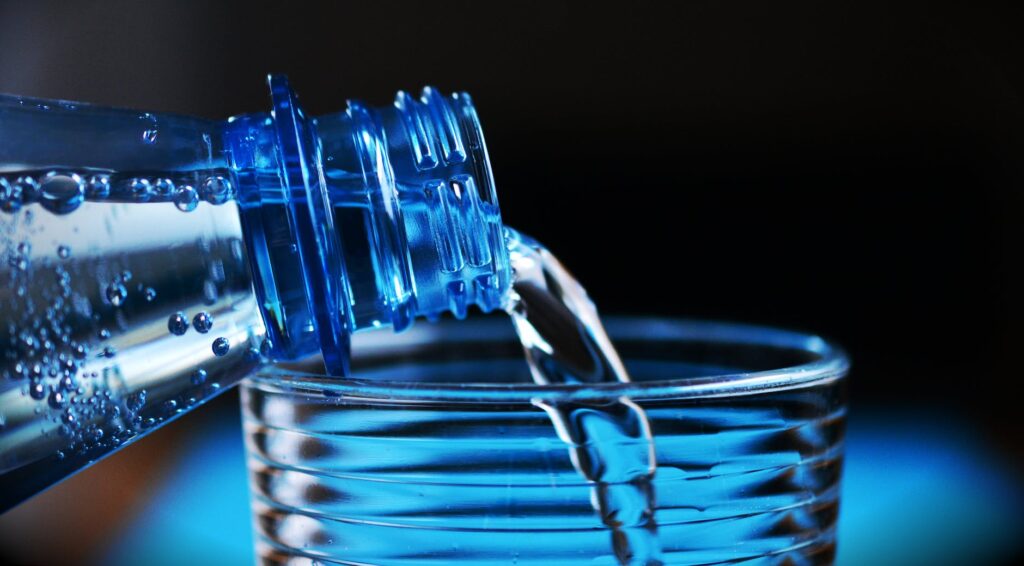
How To Store Bottled Water Correctly To Maintain Its Quality And Prevent Odor Issues
Proper storage of bottled water is crucial to maintain its quality and prevent odor issues. Here are some storage tips:
1. Temperature: Store bottled water in a cool, dry place at room temperature (around 50-70°F or 10-21°C). Avoid extreme heat or cold, as it can affect the water’s taste and potentially lead to the development of unpleasant odors.
2. Sunlight Exposure: Keep bottled water away from direct sunlight or any other sources of ultraviolet (UV) light. UV rays can degrade the quality of the water and cause chemical reactions that produce off-putting smells.
3. Proper Sealing: Ensure that the cap or lid of the bottle is tightly sealed to prevent air, moisture, or contaminants from entering. A tight seal helps maintain freshness and prevents the absorption of odors from the surroundings.
4. Avoid Strong-Smelling Substances: Store bottled water away from strong-smelling substances such as cleaning agents, chemicals, or perfumes. Water can absorb these odors, compromising its taste and odor quality.
5. Keep Away from Chemicals: Avoid storing bottled water near solvents, gasoline, paints, or other chemicals that emit volatile compounds. These substances can contaminate the water and lead to unpleasant smells.
6. Use First-In-First-Out (FIFO) Approach: If you have multiple bottles of water, follow the FIFO approach. Consume or rotate the bottles based on their purchase or expiration dates to ensure that older bottles are used first, maintaining freshness and preventing any potential odor issues due to prolonged storage.
7. Hygiene: Maintain proper hygiene when handling bottled water. Before opening a bottle, make sure your hands are clean to avoid introducing contaminants or bacteria. Also, avoid touching the inside of the cap or the bottle’s rim to minimize the risk of contamination.
8. Avoid Freezing Bottled Water: While freezing bottled water doesn’t necessarily affect its safety, it can alter the taste and potentially lead to odor issues. Freezing causes the water to expand, potentially damaging the bottle and affecting its quality when thawed.
Choosing High-Quality Bottled Water (Why Does My Bottled Water Smell Bad?)
Choosing high-quality bottled water is crucial to ensure a pleasant smell and overall taste. When it comes to choosing high-quality bottled water, here are some tips you can provide to your readers:
1. Check the Source: Look for information about the water source. Reputable brands often provide details about the origin of the water, such as natural springs or purified water from reliable municipal sources. Knowing the source can give you an idea of the water’s quality.
2. Quality Certifications: Look for bottled water brands that have obtained recognized quality certifications. Certifications from organizations like NSF International or the International Bottled Water Association (IBWA) indicate that the water has undergone testing and meets specific quality standards.
3. Read Labels and Descriptions: Pay attention to the labels and descriptions on the bottle. Look for keywords like “purified,” “filtered,” or “spring water.” Each term signifies a different process and may affect the taste and quality of the water. Understanding the terminology will help you make an informed decision.
4. BPA-Free Bottles: Consider the type of bottle used for packaging. Look for bottles that are labeled as BPA-free (Bisphenol A), as this chemical can potentially leach into the water and impact its quality. BPA-free bottles are generally considered safer and better for overall health.
5. Research Brand Reputation: Take some time to research the reputation of the brand you are considering. Look for customer reviews, ratings, and feedback online to get an idea of customer satisfaction and experiences. Reputable brands with positive feedback are more likely to provide high-quality water.
6. Consider Filtration Methods: Some bottled water brands utilize advanced filtration methods to remove impurities and improve the taste.
Look for information about the filtration methods used by the brand. Examples include carbon filtration, reverse osmosis, or distillation. Brands that invest in effective filtration techniques often offer better-tasting water.
7. Compare Price and Value: While price shouldn’t be the sole determinant, comparing the price of different bottled water options can give you a sense of value for money. Consider the brand reputation, quality certifications, and the overall benefits offered by the water when assessing its value.
8. Personal Taste Preference: Keep in mind that taste preference can vary from person to person. Even high-quality bottled water may have subtle differences in taste. If possible, try small samples of different brands to determine which one aligns with your personal taste preference.
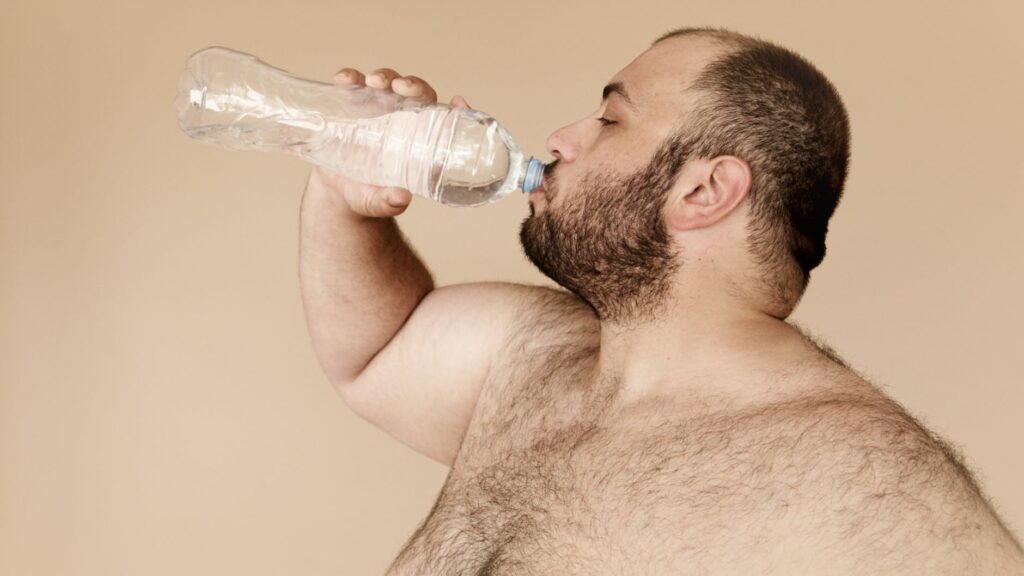
Water Quality And Health (Why Does My Bottled Water Smell Bad?)
Water quality is a critical factor in maintaining overall health and well-being. Clean, safe, and high-quality water is essential for various bodily functions and plays a vital role in supporting human health. Here are some key reasons why water quality is crucial for our well-being:
1. Hydration
Water is the primary component of the human body, making up about 60% of our weight. Staying hydrated is essential for regulating body temperature, transporting nutrients, and aiding in digestion.
Poor water quality may deter individuals from consuming enough water, leading to dehydration and potential health issues.
2. Nutrient Absorption
Water acts as a medium for transporting essential nutrients, such as vitamins and minerals, throughout the body. It helps carry these nutrients to cells and facilitates their absorption, supporting overall bodily functions.
3. Detoxification
Proper water quality is necessary for efficient detoxification processes in the body. Water helps flush out waste products, toxins, and metabolic by-products through urination and sweat.
4. Digestive Health
Clean water is essential for promoting a healthy digestive system. It aids in breaking down food, absorbing nutrients, and preventing constipation.
5. Organ Function
Water is crucial for the optimal functioning of organs like the kidneys, liver, and brain. Adequate hydration supports these organs in filtering and eliminating waste products, maintaining electrolyte balance, and facilitating cognitive function.
6. Immune System Support
Staying hydrated with clean water is linked to a stronger immune system. It helps in the production of lymph, which carries white blood cells and other immune system components to fight off infections.
7. Joint Health
Water cushions and lubricates joints, promoting flexibility and reducing the risk of joint pain or discomfort.
8. Skin Health
Proper hydration with clean water helps maintain healthy skin by moisturizing it from within. It can improve skin elasticity, reduce dryness, and contribute to a radiant complexion.
9. Cardiovascular Health
Maintaining water quality is essential for supporting cardiovascular health. It helps regulate blood volume, blood pressure, and circulation, reducing the risk of cardiovascular diseases.
10. Energy Levels and Mental Clarity
Dehydration caused by poor water quality can lead to fatigue, reduced concentration, and cognitive impairment. Drinking enough clean water can boost energy levels and mental clarity.
11. Pregnancy and Children
Clean water is especially crucial during pregnancy and for infants and children, as their bodies are still developing, and they are more vulnerable to contaminants.
Common Water Contaminants (Why Does My Bottled Water Smell Bad?)
Common water contaminants that can cause water to smell bad include sulfur, algae, bacteria, and chlorine. Each of these contaminants has different sources and can have various effects on water quality. Here’s a breakdown of each contaminant:
Sulfur
Source: Sulfur is naturally present in some groundwater sources. It can also enter water supplies through industrial activities or mining operations.
Effects: When water contains high levels of sulfur, it can produce a distinct “rotten egg” smell, which is often unpleasant and off-putting. Consuming water with a strong sulfur odor can also negatively affect the taste of foods and beverages prepared with it.
Algae
Source: Algae can grow in water sources such as lakes, ponds, and reservoirs, especially during warm weather. It thrives in water with high nutrient content and sunlight exposure.
Effects: Algal blooms can produce musty or earthy odors, making the water unappealing for consumption. Some algae species can also produce toxins, which can pose health risks if ingested.
Bacteria
Source: Bacteria can contaminate water sources from various environmental factors, such as sewage, animal waste, or poorly maintained water systems.
Effects: Certain bacteria, like sulfur-reducing bacteria, can release hydrogen sulfide gas, resulting in the characteristic “rotten egg” smell. Other bacterial contaminants may not produce odors but can cause waterborne illnesses if consumed.
Chlorine
Source: Chlorine is often used as a disinfectant in public water treatment facilities to kill harmful microorganisms. It can also be present in well water as a result of disinfection or chlorination.
Effects: While chlorine helps make water safe to drink by killing bacteria and viruses, it can also impart a strong chemical smell and taste. Some people are more sensitive to chlorine odor, making it unpleasant for them to consume.
Other Organic Compounds
Source: Various organic compounds can enter water sources from agricultural runoff, industrial discharge, or improper waste disposal.
Effects: Some of these compounds can produce foul odors, such as earthy, musty, or fishy smells. They may also be associated with potential health risks, depending on the specific contaminants present.
To address bad-smelling water caused by these contaminants, appropriate water treatment methods may be necessary.
Filtration systems can help remove sulfur and organic compounds, while disinfection processes can neutralize bacteria and algae. Chlorine odor can be reduced using activated carbon filters or by allowing the water to sit exposed to air to dissipate the chlorine smell.
Regular water testing is essential to identify the specific contaminants present in the water supply. Identifying the sources of contamination and implementing appropriate treatment methods can ensure safe and pleasant-tasting water for consumption.

Water Treatment Solutions
To treat and improve the taste and odor of bottled water, you can consider the following actionable tips and specific water treatment methods:
1. Activated Carbon Filtration
- Use activated carbon filters to remove common contaminants that cause unpleasant taste and odor, such as chlorine, volatile organic compounds (VOCs), and some impurities.
- Activated carbon works by adsorbing these compounds onto its surface, resulting in improved water quality.
2. Reverse Osmosis (RO) Filtration
- Install an RO filtration system to remove a wide range of contaminants, including dissolved solids, heavy metals, and other impurities that contribute to bad taste and odor.
- RO systems force water through a semi-permeable membrane, leaving behind most contaminants.
3. UV Disinfection
- Consider using UV disinfection to kill harmful microorganisms like bacteria, viruses, and parasites that may cause odor or affect water safety.
- UV light disrupts the DNA of these microorganisms, rendering them harmless and odor-free.
4. Ozonation
- Ozonation involves injecting ozone gas into water to disinfect and remove bad odors and tastes caused by organic compounds and microorganisms.
- Ozone breaks down and oxidizes these contaminants, resulting in improved water quality.
5. Distillation
- Distillation is an effective method to remove impurities and contaminants from water, including those causing unpleasant taste and odor.
- The process involves boiling water, capturing the steam, and then condensing it back into liquid form, leaving behind most contaminants.
6. Ion Exchange
Ion exchange resins can help remove dissolved ions like calcium and magnesium, which may contribute to water hardness and affect taste.
These resins replace undesirable ions with less objectionable ones, leading to better-tasting water.
7. Filtration with Zeolite or Silica Sand
- Zeolite or silica sand filters can effectively remove certain odor-causing compounds and sediment from water.
- These filters work well for addressing earthy or musty smells and improving water clarity.
8. Adding Lemon or Citrus
If the bottled water has a mild or temporary unpleasant taste, adding a slice of lemon or citrus fruit can help mask the unwanted flavor.
9. Proper Storage and Sealing
- Ensure that bottled water is stored properly, away from direct sunlight and contaminants, to maintain its quality and taste.
- Keep the bottles tightly sealed to prevent the absorption of external odors.
It’s essential to note that the specific treatment method required will depend on the source and nature of the contaminants in the bottled water. Before implementing any water treatment solution, consider having the water tested to identify the exact issues and select the most appropriate treatment method.
Benefits of Hydration (Why Does My Bottled Water Smell Bad?)
Hydration, which refers to maintaining adequate water levels in the body, offers numerous benefits for overall health and well-being. Here are some key advantages of staying properly hydrated:
- Regulates Body Temperature: Adequate hydration helps regulate body temperature by facilitating sweat production, which cools the body during physical activity or exposure to high temperatures.
- Supports Nutrient Transport: Water acts as a medium to transport essential nutrients, vitamins, and minerals throughout the body, ensuring proper functioning of various organs and systems.
- Enhances Digestion: Drinking enough water aids in digestion by breaking down food and promoting the smooth movement of nutrients through the digestive tract.
- Flushes Out Toxins: Hydration supports the proper functioning of the kidneys, helping to flush out waste products and toxins from the body through urine.
- Boosts Energy Levels: Being properly hydrated can increase energy levels and reduce feelings of fatigue, leading to improved physical and mental performance.
- Maintains Healthy Skin: Sufficient water intake moisturizes the skin, promoting elasticity and reducing the appearance of fine lines and wrinkles.
- Supports Joint Health: Water lubricates joints and cushions cartilage, reducing friction and minimizing the risk of joint pain or discomfort.
- Aids in Weight Management: Drinking water can help control appetite and reduce calorie intake, contributing to weight management efforts.
- Improves Cognitive Function: Proper hydration is associated with better cognitive performance, including improved concentration, focus, and memory.
- Boosts Immune System: Staying hydrated supports a robust immune system, helping the body fight off infections and illnesses more effectively.
- Prevents Dehydration: Regular hydration prevents dehydration, which can lead to dizziness, weakness, confusion, and in severe cases, medical emergencies.
- Enhances Physical Performance: Hydration is crucial for athletes and those engaged in physical activities, as it improves endurance, reduces the risk of cramps, and aids in recovery.
- Supports Cardiovascular Health: Sufficient water intake helps maintain blood volume and circulation, supporting cardiovascular health.
- Alleviates Headaches: Dehydration can trigger headaches and migraines, while adequate hydration may help reduce their frequency and intensity.
- Encourages Healthy Habits: Staying hydrated often encourages individuals to make healthier choices overall, leading to a more balanced lifestyle.
It’s essential to listen to your body’s signals and drink water regularly throughout the day, even if you don’t feel particularly thirsty. Remember that individual hydration needs may vary based on factors such as age, activity level, climate, and overall health.
Maintaining proper hydration is a simple yet powerful way to support your body’s optimal functioning and overall well-being.
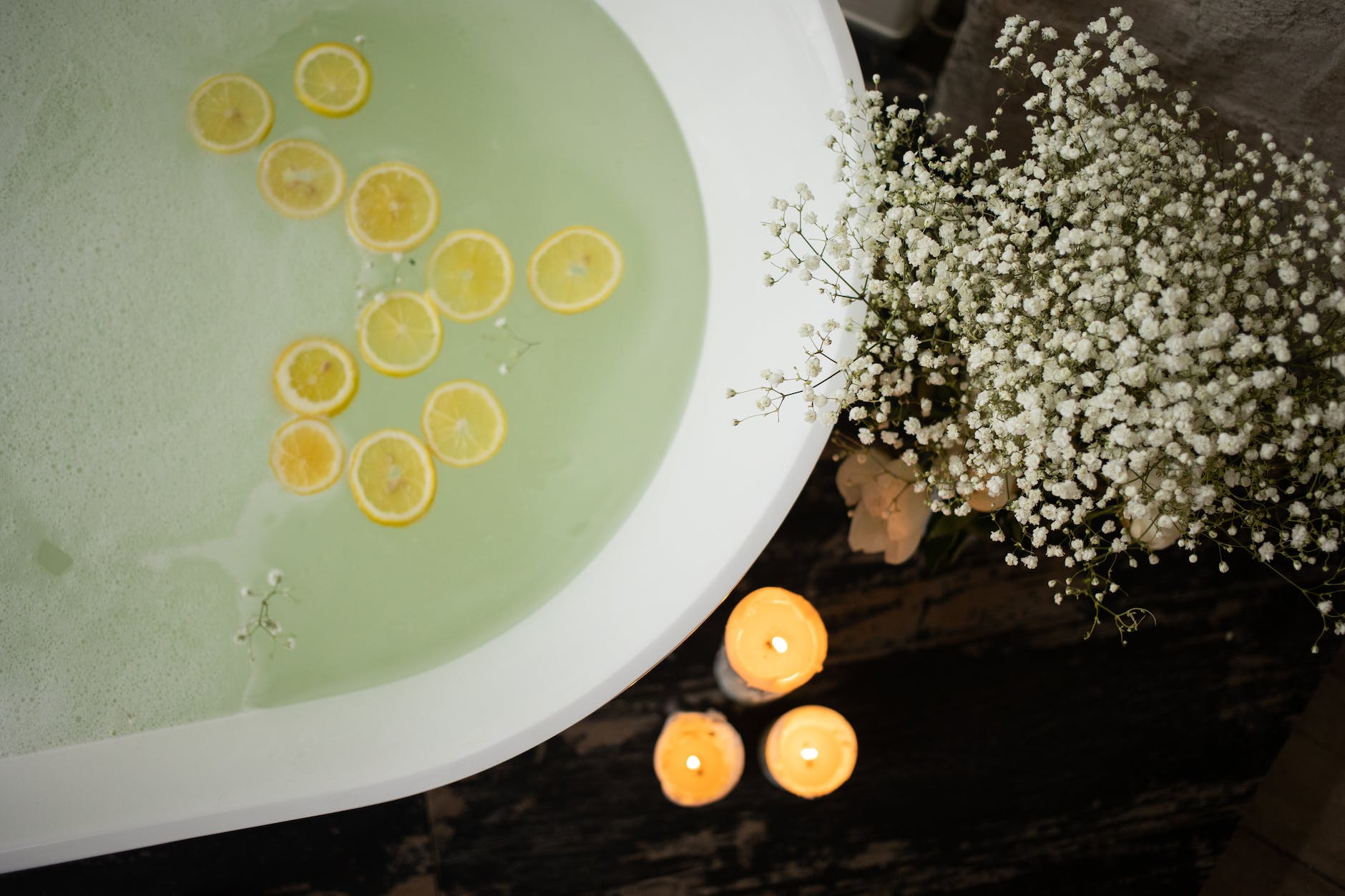
DIY Remedies for Bad-Smelling Water (Why Does My Bottled Water Smell Bad?)
Before you use DIY, make sure to check if the bad-smelling water is safe for consumption. If you have bad-smelling water and are looking for some DIY remedies to improve the taste and odor, here are some simple and cost-effective solutions to try:
1. Boiling Water
Boiling water can help eliminate some volatile organic compounds (VOCs) and reduce certain odors. Allow the water to cool before drinking.
2. Adding Citrus Fruits
Squeeze the juice of a lemon, lime, or orange into a glass of water. The natural citrus oils can help mask unpleasant odors and improve the taste.
3. Using Cinnamon Sticks
Add a cinnamon stick to a pitcher of water and let it infuse for a few hours. Cinnamon can impart a pleasant aroma and flavor to the water.
4. Peppermint Leaves or Mint Extract
Add fresh peppermint leaves or a few drops of mint extract to your water. Mint can provide a refreshing taste and aroma.
It’s important to note that these DIY remedies are intended for addressing minor taste and odor issues in drinking water.
If you suspect a more significant water quality problem or persistent bad smells, it’s best to get the water professionally tested to identify any potential contaminants and consider appropriate water treatment methods.
Additionally, ensure that the ingredients used in DIY remedies are safe and suitable for consumption.
Plastic Water Bottle Smells Like Mildew (Why Does My Bottled Water Smell Bad?)
Mildew is a fungus that grows in warm, damp environments. It can often be found growing on clothes, leather, paper, and even food. Mildew has a musty, earthy smell that is caused by mold spores that are released into the air.
Mold can often grow on water bottles that are not cleaned regularly. The warm, damp environment inside the water bottle is the perfect breeding ground for mildew. If you notice a mildew smell coming from your water bottle, it’s important to clean it immediately to prevent the growth of mold.
There are a few ways to clean a water bottle that has mildew growing on it. First, you can mix a solution of bleach and water and use this to clean the inside of the water bottle. You can also use vinegar or baking soda to clean the mildew.
Why Does Bottled Water Smell Like Chemicals
When you open a bottle of water, you might notice a faint smell of chemicals. This is because bottled water contains trace amounts of chemicals, such as chlorine, that are used to kill bacteria. While these chemicals are safe to consume in small amounts, they can give water a distinct smell.
If you’re concerned about the chemicals in your water, you can try filtering your water at home or buying water that is specifically labeled as “chemical free.” However, it’s important to remember that even “chemical-free” water may still contain small amounts of chemicals.
The best way to ensure that your water is free of chemicals is to drink from a water source that is regularly tested and monitored for safety.
Why Does My Water Bottle Smell Like Rotten Eggs
If you notice that your water bottle smells like rotten eggs, it is likely due to a build-up of sulfide gas or sulfur bacteria in your water supply. Bacteria can also grow in water bottles, especially if they are not cleaned regularly. When bacteria grow, they can produce a sulfur smell that can make your water bottle smell bad.
If you notice that your water bottle smells like rotten eggs, you should clean it immediately. You can clean your water bottle with mild soap and water. You should also make sure to clean your water bottle regularly to prevent the build-up of bacteria. You can also contact your water supplier for clarification.
Why Does My Water Bottle Taste Weird
If you’ve ever taken a sip of water from your water bottle and cringed at the taste, you’re not alone. Water bottles can start to develop a weird taste for a number of reasons – and it’s usually not because the water itself is bad.
One of the most common causes of a weird-tasting water bottle is bacteria. If your water bottle isn’t cleaned regularly, bacteria can start to grow inside of it. This can cause your water to taste metallic or even sour.
Another common cause of a bad-tasting water bottle is the material it’s made out of. If your water bottle is made out of plastic, it may absorb some of the chemicals from the plastic over time. This can give your water a chemical taste that is unpleasant.
If you’re noticing that your water bottle has a weird taste, it’s probably time to get a new one.
If you don’t like the taste of your water bottle, try using a different type of water bottle. There are many different types of water bottles on the market, so you should be able to find one that you like.
Stainless steel water bottles are a good option because they don’t absorb any of the chemicals from the plastic. Glass water bottles are also a good option, but they can break if you drop them.
Is It Safe To Drink From A Smelly Water Bottle
Smelly water bottles are often a sign of bacteria growth, which can lead to serious health problems if consumed. So, it is not safe to drink from a smelly water bottle. Drinking from a smelly water bottle can cause diarrhea, vomiting, stomach pain, etc.
If you come across a water bottle that smells bad, it’s best to throw it away and get a new one.
My Bottled Water Tastes Funny (Why Does My Bottled Water Smell Bad?)
If your bottled water tastes funny, there could be a few possible reasons including:
- Contamination: The water may have been contaminated with chemicals or microorganisms during the bottling process or storage. This can lead to a strange taste or odor.
- Stale Water: If the water has been stored for a long time or exposed to sunlight or high temperatures, it may become stale and develop a strange taste.
- Chemical Composition: Some minerals and dissolved solids in the water can affect the taste. Different brands of bottled water have different mineral compositions and may have distinct tastes.
- Plastic Bottle: The taste of the water can also be affected by the plastic used in the bottle. Certain types of plastic may leach chemicals into the water over time, which can affect the taste.
If you notice a funny taste or odor in your bottled water, it is best to stop drinking it and contact the manufacturer to report the issue. You can also try switching to a different brand of bottled water to see if the taste improves.
How To Get Rid Of Bottled Water Bad Smell Naturally
We have all been there- our water bottle smells and we do not know how to get rid of the bad smell. It is unhygienic to drink from a water bottle that smells bad, and no one wants to smell water bottle odor all day long.
Here are some tips on how to get rid of bad smells from water bottles naturally:
- Rinse your water bottle with hot water and soap after each use.
- Fill your water bottle with a mixture of equal parts water and vinegar, and let it sit overnight. In the morning, rinse your water bottle with hot water.
- Fill your water bottle with hot water and a few slices of lemon. Let it sit for a few hours, then rinse it with hot water.
By following these tips, you can get rid of bad smells from water bottles naturally.
Why Do Plastic Water Bottles Smell (Why Does My Bottled Water Smell Bad?)
Plastic water bottles can develop a smell due to a variety of reasons, including:
- Bacteria growth: If the water bottle is not cleaned properly or regularly, bacteria can grow inside and cause an unpleasant smell.
- Chemicals in the plastic: Certain plastic water bottles may contain chemicals that can leach into the water and cause a smell.
- Exposure to heat: If a plastic water bottle is left in a hot environment, such as a car on a sunny day, it can cause the plastic to release odors.
- Residue from other beverages: If a plastic water bottle is used to hold other drinks, such as juice or soda, it can leave a residue that can cause a smell.
Why Does My Metal Water Bottle Smell (Why Does My Bottled Water Smell Bad?)
There are a few reasons why your metal water bottle might smell:
- Bacteria growth: If you don’t clean your water bottle regularly, bacteria can grow inside the bottle, leading to unpleasant smells. This is especially true if you store your water bottle in a warm or humid environment.
- Leftover liquids: If you leave a liquid in your water bottle for too long, it can start to smell bad. This is especially true for sugary or acidic drinks, which can leave behind residue that is difficult to clean.
- Material of the water bottle: Some types of metal used in water bottles can be more prone to absorbing odors than others. For example, aluminum water bottles are more likely to absorb odors than stainless steel water bottles.
To prevent your metal water bottle from smelling, it’s important to clean it regularly with hot, soapy water. You can also try using a solution of equal parts water and vinegar to remove any lingering odors.
Additionally, make sure to rinse your water bottle thoroughly after each use and avoid leaving liquids in the bottle for an extended period of time.
Why Does My Water Bottle Smell (Why Does My Bottled Water Smell Bad?)
There are several reasons why your water bottle may have a smell:
- Bacteria growth: If you haven’t cleaned your water bottle regularly, bacteria can accumulate inside the bottle, which can cause a foul odor.
- Food or drink residue: If you use your water bottle to store other liquids besides water, residue from those beverages or foods can stick to the inside of the bottle and cause an unpleasant smell.
- Poor quality materials: Water bottles made from low-quality materials may have an inherent smell due to chemicals or other substances used in the manufacturing process.
- Storing the bottle in a warm environment: If you leave your water bottle in a warm or hot environment for an extended period, such as inside a car on a sunny day, it can cause the plastic to release a strong odor.
To eliminate the smell in your water bottle, try the following:
- Wash the bottle thoroughly with soap and water.
- Use a mixture of vinegar and water to clean the bottle.
- Soak the bottle in a mixture of baking soda and water.
- If the smell persists, consider replacing the bottle with a higher-quality one.
READ THIS TOO: Why Does Bottled Water Taste Metallic – Should I Be Worried?
The Bottom Line On Why Does My Bottled Water Smell Bad
Why Does My Bottled Water Smell Bad is a common question. If your bottled water tastes or smells bad, it’s probably due to the materials the bottle is made from. Plastic bottles can also absorb flavors and chemicals from their surroundings, which can then be transferred to the water.
Avoid drinking water with a bad smell because the odor could be caused by bacteria or other things that can give you health concerns. Stainless steel bottles are a better option because they don’t absorb flavors or chemicals.
